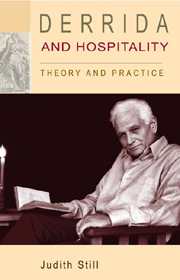Book contents
- Frontmatter
- Contents
- Acknowledgements
- Abbreviations
- 1 Introduction to the question of hospitality: ethics and politics
- 2 Patriarchs and their women, some inaugural intertexts of hospitality: the Odyssey, Abraham, Lot and the Levite of Ephraim
- 3 Friendship and sexual difference: hospitality from brotherhood to motherhood and beyond
- 4 Frenchalgeria – (not) asking for a name, naming, calling by name in tales of Algerians
- 5 The dangers of hospitality: the French state, cultural difference and gods
- 6 Animals and what is human
- 7 Concluding around hospitality
- Bibliography
- Index
1 - Introduction to the question of hospitality: ethics and politics
Published online by Cambridge University Press: 12 September 2012
- Frontmatter
- Contents
- Acknowledgements
- Abbreviations
- 1 Introduction to the question of hospitality: ethics and politics
- 2 Patriarchs and their women, some inaugural intertexts of hospitality: the Odyssey, Abraham, Lot and the Levite of Ephraim
- 3 Friendship and sexual difference: hospitality from brotherhood to motherhood and beyond
- 4 Frenchalgeria – (not) asking for a name, naming, calling by name in tales of Algerians
- 5 The dangers of hospitality: the French state, cultural difference and gods
- 6 Animals and what is human
- 7 Concluding around hospitality
- Bibliography
- Index
Summary
Once again, here as elsewhere, wherever deconstruction is at stake, it would be a matter of linking an affirmation (in particular a political one), if there is any, to the experience of the impossible, which can only be a radical experience of the perhaps.
(Une fois de plus, ici comme ailleurs, partout où il y va de la déconstruction, il s'agirait de lier une affirmation (en particulier politique), s'il y en a, à l'expérience de l'impossible, qui ne peut être qu'une expérience radicale du peut-être.)
We all think that we know something about hospitality – it's an everyday experience. Yet it has also been a burning topic of philosophical and political debate over the last couple of decades, and my epigraph indicates the complexity of the hinge or brisure between politics and philosophy here. Why has hospitality recently enjoyed a renaissance? This could be related to at least three factors. The first would be recent movements of population towards, and within, an expanded Europe: what is conceived as economic immigration and also, notably, the arrival of asylum seekers and refugees. The political reaction in the nation states of the pre-expansion European community to these newcomers is often phrased in the language of (the limits of) hospitality. In France in particular there has subsequently been a significant response, not only by political scientists or sociologists, but also from the arts and philosophy, in the face of the increasing inhospitality of the French state.
- Type
- Chapter
- Information
- Derrida and HospitalityTheory and Practice, pp. 1 - 50Publisher: Edinburgh University PressPrint publication year: 2010



